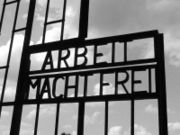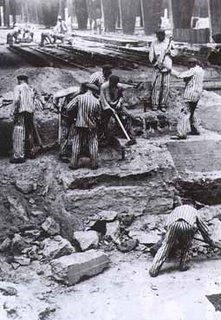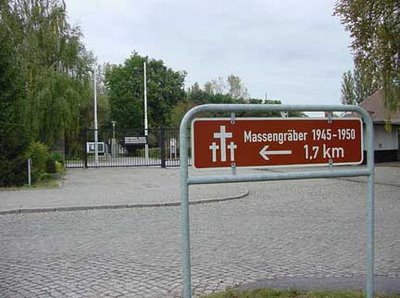On Sunday I found myself explaining why we only take home just enough bread from church to last the week to our son Joshua. I explained how God blesses us with the bread and if we took more than we could use, it would mold and be of no use. Before I knew it, our ‘weekly’ bread, had become the daily bread of Exodus. When I was done he had totally made the connection and understood the concept of trusting and obeying God as I had explained it. What an awesome way to look at life.
Last night, while watching the History Channel , that concept of the hyperlink kicked in again. I was watching a show on the monuments that Hitler was planning on building. A single word triggered a link back to Exodus again. It was “bricks“. Hitler needed bricks for his building projects. In Berlin he got them from the Klinkerwerk at the Sachsenhausen concentration camp. Jews, along with others considered undesirable, were used as slave labor to make these bricks. They were often beaten with whips and worked to death in order to meet their quota. I couldn’t help seeing the similarities between the Nazis and the Egyptians.
 On the front entrance gates to Sachsenhausen is the infamous slogan Arbeit Macht Frei, "Work Makes You Free".
On the front entrance gates to Sachsenhausen is the infamous slogan Arbeit Macht Frei, "Work Makes You Free". Prisoners perform forced labor in the brickworks (Klinkerwerk) at Sachsenhausen.
Prisoners perform forced labor in the brickworks (Klinkerwerk) at Sachsenhausen.The biblical hyperlinks didn’t end there. The Soviets took control of Sachsenhausen in 1945 and renamed it Special Camp No. 7. With the exception of the crematoria and extermination facilities, the camp was put back into use to hold Nazi functionaries, political undesirables, arbitrarily arrested prisoners, and inmates sentenced by the Soviet Military Tribunal. By 1950 when the camp closed, 12,000 people had died there from starvation and malnutrition. Christians were seen as a threat to communist rule, so it is no surprise to learn that they were persecuted by the Soviets. So many Christians were starved to death at Special Camp No. 7 that they had to be buried in a mass grave. Would it be a stretch to say that Nero and Stalin had a few things in common?


No comments:
Post a Comment